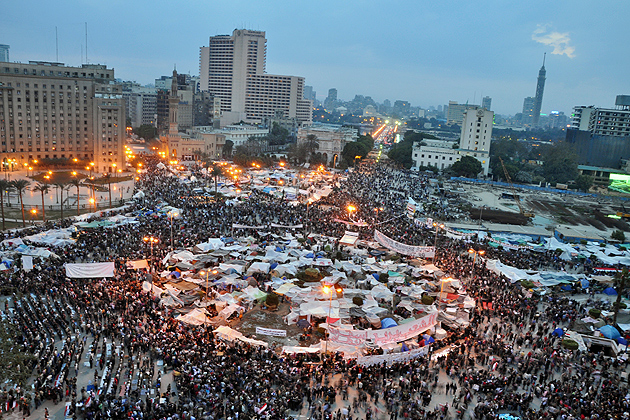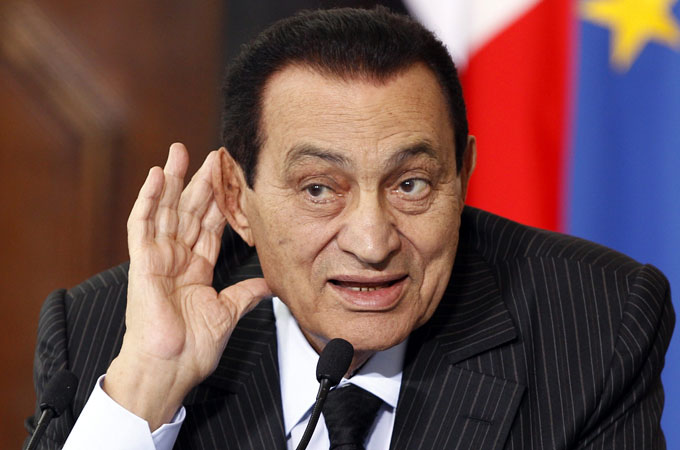The Regime and it's Military : A Tale of Two Friends
By Alex Stoupas
Through-out the Arab Spring, the relationships between military and regime within Egypt, Libya, and Tunisia played unique yet pivotal roles amongst uprisings. Regimes facing serious over throw, asked them selves if a military response was in order, as a result of chaotic protests. This of course was not all ways the choice of said regime, due to the fact that several militant leader’s through-out the Arab world faced very little jurisdiction under their dictators. In the case of Egypt and Tunisia, militaries did not use excessive force against demonstrators, while in Libya there was a significant response, radically resulting in a small scale war. These drastic difference’s in action emphasize the sheer power of those in charge, both dictators and militants a like.
The ultimate factor that resulted in military intervention during uprisings completely depended on the relationship between military leadership and it’s countries regime. Unfortunately this decision was not influenced by the empathy either parties had for the greater good of society, rather their own general well being. If militants deemed their own survival to be solely dependent on the regime standing up straight, then by no doubt would they support that. On the other hand, if military leaders foresaw benefits resulting in an over throw, then why not let it happen, and go easy on protesters. This is where the difference lays between Egypt and Tunisia, as opposed to Libya.
In the interesting case of Egypt, military forces chose not to intervene through-out various stages of revolts; despite the fact that the regime had been proved fruitful over the years. During that time, the Egyptian military had proven it’s self as a highly professional and well respected organization. However, over the last ten years Mubarak had been organizing for his son to step into power, a less favorable decision in the eyes of the Military ( Ikeda ). This caused the military to lose significant faith, and interest in Mubarak’s regime. “The generals felt their influence slipping away as Mubarak disregarded their economic interests, ignored their advice on ministerial appointments, and organized a campaign to transfer power.” ( Steinman )

Day by day the Egyptian military was drifting astray, out from within the grips of the regime; now what they focused on was be-friending the people, with the future in mind. Once protests started it is easy to understand why the military chose to sit out, and let the government disintegrate; not only did this maintain it’s professional image, but it was able to remain favorable amongst working Egyptians. Funny enough, there was an arrest campaign enacted by Egyptian military imposed on members of Mubarak’s inner circle. This however is contradicted by the brutal retaliation acted upon by various security forces during several protests (Ikeda). But by eventually ousting Mubarak, the Egyptian military was able to impose and develop a steady form of democracy, gaining the credibility of those seeking a brighter future.
Let’s travel a little bit east, to the country that sparked it all, Tunisia. Unlike the Egyptian military, Tunisian military had never developed a friendly relationship with the regime in power. Tunisia being mostly a neutral area, with not a lot of “beef” in relation to other countries, their military is a minuscule part of the state. They are mostly concerned, and used for border control and emergency aid (Steinman). So, with no reason to rely, and truly connect with dictator Ben Ali and his regime, why should they be concerned with protesters, attempting to bring down a shaken, over-due, and corrupt system.

The military, knowing that it already has a positive relationship with the people, and certainly not a violent one, they were pleased to become the go-to’s, after an obvious soon to be downfall. In praise to the military, when Ben Ali ordered the military to open fire upon protesters, army chief General Rachid Ammar refused. He later then advised Ben Ali, to flee the country ( Maddy-Weitzman). This makes me happy, a lot of arab countries militaries in fact did rely on their regimes power, making them themselves powerful. In the case of Tunisia, after the revolt, military leaders arrested the top security figures of the regime, and quickly began to re-establish order through-out the country, at least for the time being (Hazen).

Now we’ll head back east, to Tunisia’s not so friendly neighbor, Libya. Libya had been under Gaddafi’s power for almost 40 years, he had personally picked the leaders below him, as a matter a’ fact, he had personally BREED the leader’s he dictated below him. His regime relied on brutal force, tribal alliances, and not taking no for an answer; and with his sons in command of military forces, he had them in his pocket. Even though Gaddafi eventually fell, his military relentlessly fought for him and his regime, killing several thousands of Libyans, comprised of rebels, organized counter-forces, and civilians. As Gaddifi’ cowardly ran across the coast, declaring random cities as the countries new capitol, military forces followed, protecting him, and swearing by his rule ( My own Libyan Presentation). In this case, military relayed completely on the success of the regime, and without them, they would have nothing.

It is clear that each country had it’s own unique struggle and journey through-out the arab spring. The relationship that had been developed over years of countless rule under the regime, had been a deciding factor, contributing to military assistance during protests. In the case of Egypt, Libya and Tunisia, militaries found them selves in completely different situations, and acted as so; yet their were a dozen other arab countries that also underwent the same movements, they too, were also dealt a separate hand of cards. I believe people’s military should act for the greater good of their country, and for the majority of their people; not for those who hide behind power.
Steinman, Daniel. "Muftah - Military Decision-Making During the Arab Spring." Muftah RSS. N.p., n.d. Web. 14 Apr. 2014. <http://muftah.org/military-decision-making-during-the-arab-spring/>.
Ikeda, Akifumi. "The Armies in the Arab Spring - Some Thoughts on the Civil-military Relations." (n.d.): n. pag. Web.
Bruce Maddy-Weitzman, "Tunisia's Morning After" Middle east quarterly18, no3 (2010)
My in class presentation on Libya.. ( In class ).
"The Arab Spring: Explaining Arab Military Behavior Through State SecurityApparatuses." By Timothy Hazen. N.p., n.d. Web. 14 Apr. 2014. <http://papers.ssrn.com/sol3/papers.cfm?abstract_id=2378537>.


No comments:
Post a Comment